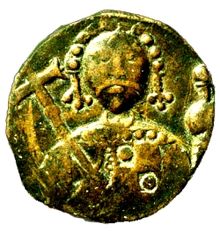
Back روبرت جيسكارد Arabic روبرت جيسكارد ARZ Robert Qviskar Azerbaijani Роберт Гвіскар Byelorussian Робер Гискар Bulgarian Robert Guiscard Breton Robert Gviskard BS Robert Guiscard Catalan Robert Guiscard Czech Robert Guiscard Welsh
| Robert Guiscard | |
|---|---|
 Coin of Robert Guiscard | |
| Count of Apulia and Calabria | |
| Reign | August(?) 1057 – 23 August 1059 |
| Predecessor | Humphrey of Hauteville |
| Duke of Apulia and Calabria | |
| Reign | 23 August 1059 – 17 July 1085 |
| Successor | Roger Borsa |
| Lord of Sicily | |
| Reign | 23 August 1059 – 1071 |
| Successor | Roger I |
| Prince of Benevento | |
| Reign | 1078 - 1081 |
| Predecessor | Landulf VI |
| Born | c. 1015 Hauteville-la-Guichard or somewhere else in Contentin, Normandy |
| Died | 17 July 1085 (aged 69–70) Cephalonia |
| Burial | |
| Spouses | Alberada of Buonalbergo, Sikelgaita |
| Issue | By Alberada (ill.): Bohemund I Emma By Sikelgaita: Elena (Olimpyas) Héria or Gersent, (wife of Hugh V) Matilda Roger Borsa Guy Sybilla, (wife of Ebles II) Mabile Robert Scalio |
| Noble family | Hauteville |
| Father | Tancred of Hauteville |
| Mother | Fressenda |
| Religion | Catholic |
Robert "Guiscard" de Hauteville, sometimes Robert "the Guiscard" (/ɡiːˈskɑːr/ ghee-SKAR,[1] Modern French: [ɡiskaʁ]; c. 1015 – 17 July 1085), was a Norman adventurer remembered for his conquest of southern Italy and Sicily in the 11th century.[2]
Robert was born into the Hauteville family in Normandy, the sixth son of Tancred de Hauteville and his wife Fressenda. Through his mother, he was possibly a grandson of Richard the Fearless. He inherited the County of Apulia and Calabria in 1057, and in 1059 he was made Duke of Apulia and Calabria[3] and Lord of Sicily[4] by Pope Nicholas II. He was also briefly Prince of Benevento (1078–1081), before returning the title to the papacy.
Robert's sobriquet, in contemporary Latin Viscardus and Old French Viscart, is often rendered "the Resourceful", "the Cunning", "the Wily", "the Fox", or "the Weasel". In Italian sources he is often identified as Roberto il Guiscardo or Roberto d'Altavilla (meaning Robert de Hauteville), while medieval Arabic sources call him simply Abārt al-dūqa (Duke Robert).[5]
- ^ "Robert Guiscard". Merriam-Webster.com Dictionary. Retrieved 14 January 2019.
- ^ "Robert Guiscard (c. 1015–1085)". www.thelatinlibrary.com. Retrieved 28 January 2021.
- ^ "Robert Guiscard (c. 1015–1085)". www.thelatinlibrary.com. Retrieved 28 January 2021.
- ^ "Robert Guiscard (c. 1015–1085)". www.thelatinlibrary.com. Retrieved 28 January 2021.
- ^ Johns 2015, p. 124.
© MMXXIII Rich X Search. We shall prevail. All rights reserved. Rich X Search